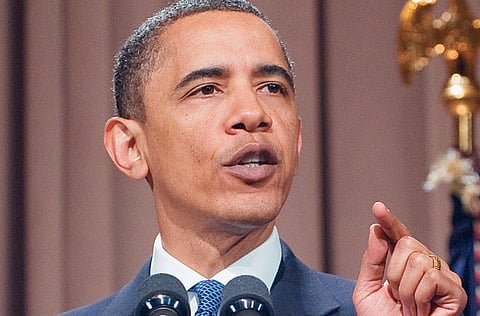Obama silences critics
Anne Applebaum writes: US president's handling of the Bin Laden operation could raise his popularity stakes and make things difficult for Republicans in 2012

It's always satisfying when hoary old national stereotypes suddenly prove to be true. Last Friday, the British were brought together as a nation by a royal wedding. On Sunday, Poland was brought together as a nation by the beatification of the former pope. Later that day — and well into Monday morning — Americans were brought together as a nation by their delight in the execution of Osama Bin Laden.
Think back, if you can, to the aftermath of the September 11 attacks on the Pentagon and the World Trade Centre: for many weeks, the citizens of the US — Democrats, Republicans, independents — were unified in sorrow, patriotism and anger. That sense of unity persisted for a long time: It was enough to guarantee Congressional, media and political support for the invasion of Afghanistan, as well as for the invasion of Iraq.
The wars, the financial crisis and the subsequent recession had chipped away at American non-partisan, post-September 11 patriotism until there was practically nothing left of it. The Democrats came to loathe the Iraq war. The Republicans came to loathe the war's opponents.
Far from unifying in the wake of Obama's election, the parties split apart further and the public became polarised, thanks in part to a new breed of fanatical talk-show hosts, bloggers and political celebrities who realised that they could make money, attract viewers and possibly win votes with extremist and even outrageous rhetoric.
This surge of political nastiness hit its absurd peak only last week, when Obama finally felt compelled to release the original, long-form version of his birth certificate, proving he had in fact been born in Hawaii, not in Kenya.
But that was not good enough for (depending on which polls you believe) up to 25 per cent of Americans, and a much larger percentage of Republicans.
In the wake of this operation, they'll have to think twice. After all, George W. Bush — a cowboy-boot wearing, slang-talking American — called for the US to haul in Bin Laden, "dead or alive". But Barack Obama — whose middle name is ‘Hussain', whose surname rhymes with ‘Osama', — is the one who actually did it.
Astute planning
More to the point, the nature of the operation speaks well of him. He has been part of the planning for months. He personally authorised the special forces operation a few days ago. According to the official version of events, the raid took some 40 minutes, few civilians were injured and no Americans were killed.
In other words, the whole thing appears to have been handled with efficiency and competence of a kind we no longer automatically expect from Americans.
Amidst the celebrations which will follow, some of the ‘birthers' will be surely be forced to concede that Obama must really be American after all. Even his more mainstream critics might feel more warmly about him. As the British well know, it's no fun to be told constantly that your nation is in decline, that your economy is sinking and that your leadership of the world is in jeopardy.
Every once in a while, it's nice to hear that your president achieved something concrete, that your armed forces are efficient, and that your security services aren't as clueless as they seem.
Unfortunately for Obama, this wave of enthusiasm comes too early to affect his political prospects directly: November 2012, the next election day, is still far away, and by the time it rolls around, Bin Laden will belong to the distant political past.
Nevertheless, the timing of this announcement comes at a critical stage in the American political cycle. If it seems like Obama might become popular again, skittish potential candidates will think twice about throwing their hats into the ring. And if they don't make the decision quickly, it will be too late.
The timing matters in another way, too: The 10th anniversary of the September 11 attacks is this year. On that day, it will be impossible to avoid asking what has been achieved — and what has not been achieved — in the decade since Al Qaida attacked the World Trade Centre and the Pentagon. In the lists which will be composed, there will be many failures — alongside one singular, notable success. That will be Obama's success — and the ‘anti-war' Democrats' success as well.
— The Telegraph Group Ltd, London 2011


